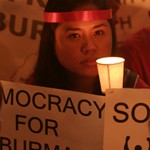 Neither Free nor Fair – Burma’s Sham Elections
Neither Free nor Fair – Burma’s Sham Elections
By Jonathan Fox
 Life under the military junta in Burma (Myanmar) shares little in common with the famous casino town of Las Vegas. Yet in one respect they are alike – no matter what game you play, the house always wins.
Life under the military junta in Burma (Myanmar) shares little in common with the famous casino town of Las Vegas. Yet in one respect they are alike – no matter what game you play, the house always wins.
While Las Vegas has cleaned up its act over the past few decades, Burma is still tightly controlled by a relentless military junta. The upcoming November elections may be a new game for Burma’s ruling generals but their success is all but guaranteed.
Burma’s upcoming elections, scheduled for the auspicious date of November 7 by the superstitious military chiefs, have recently headlined in the newspapers. These elections are considered by some to be a sign of progress in a country held in a deadly political deadlock since the 1990’s. For others, including leading Burmese political and social activists, these elections are no more then an elaborate ruse to make the military’s control over Burma permanent. With millions of Burmese refugees and migrant workers living across Southeast Asia, the outcome of these elections will shape – for better or worse – Burma’s future and the stability of the entire region. Thailand will also experience the effect of the coming elections, as so many Burmese enter Thailand as migrant workers. Even though they are granted rights under Thailand law, Burmese workers still face a low quality of life in Thailand.
These are not the first elections under Burma’s notoriously controlling military elites, and past experiences give plenty of reasons for concern. In 1990 the generals conceded to both domestic and international pressure and called for the nation’s fourth general election. Much to the junta’s surprise those elections led to the electoral landslide by Daw Aung San Suu Kyi’sNational League for Democracy (NLD), who took 392 of the 492 available seats. Yet the military junta refused to recognize the election results, ignoring the will of the people inside Burma. Instead they fortified their hold on power, ruling the nation under the new banner of the State Peace and Development Council (SPDC).
A Brief Overview: Daw Aung San Suu Kyi
Aung San Suu Kyi, 64, holds a unique role in Burma’s history. A pro-democracy leader, Nobel Peace laureate, and only daughter of Aung San, father of modern-day Burma, many Burmese see her as an icon of hope for the eventual end of the nation’s long history of military oppression. Aung San Suu Kyi returned to live in Burma in 1988 to tend to her elderly mother, but could not ignore the nationwide mass demonstrations calling for democracy in Burma. During the late 1980s Aung San Suu Kyi took a leading role in the pro-democracy movement, eventually becoming the NLD General Secretary in the run up to the 1990 elections.
With her return Aung San Suu Kyi quickly began to contend with threats and arrest by Burma’s military rulers. She has spent the better part of the last twenty years under house arrest, her movements tightly monitored and restricted. Aung San Suu Kyi’s most recent incarceration followed the intrusion of John William Yettaw, a 53-year-old American man, who swam across Rangoon’s Inya Lake to gain access into her guarded lakeside residence. While the American reportedly swam uninvited on a “mission from God”, SPDC authorities later arrested and charged Aung San Suu kyi with breaching the conditions of her own detention by accepting the un-called guest.
In August 2009, a Burmese court sentenced Aung San Suu Kyi to three years in prison and hard labor for violating the conditions of her house arrest during the Yettaw incident. Junta chief Senior General Than Shwe later commuted her sentence to eighteen months under house arrest. The court also sentenced John Yettaw to seven years in prison, including four years of hard labor, on charges of trespassing, immigration violation, and swimming in a restricted zone. Shortly after, his sentence was commuted in half for health reasons, suspending the remaining three-and-a-half years upon Yettaw’s deportation from Burma. The trial and subsequent sentencing were roundly condemned by the international community, including U.N. Secretary General Ban Ki Moon who was “deeply disappointed by the verdict in respect of Daw Aung San Suu Kyi.”1 Critics claim that the arrest and continued detention under dubious circumstances are designed to keep Aung San Suu Kyi away from the public until after the scheduled elections take place.
Crimes Against Humanity, a Backdrop for Elections?
When SPDC junta officials talk of free elections and democracy, it is important to recognize the context in which the November elections will take place. Far from what most people consider a free society, people living in Burma are confronted with daily intimidation, harassment and fear.2 Crimes against humanity are well documented inside Burma, compiling a dismal list of the continued human rights violations in Burma. These include murder, forced slavery, displacement, torture, rape, and even the documented use of child soldiers by junta security forces.
